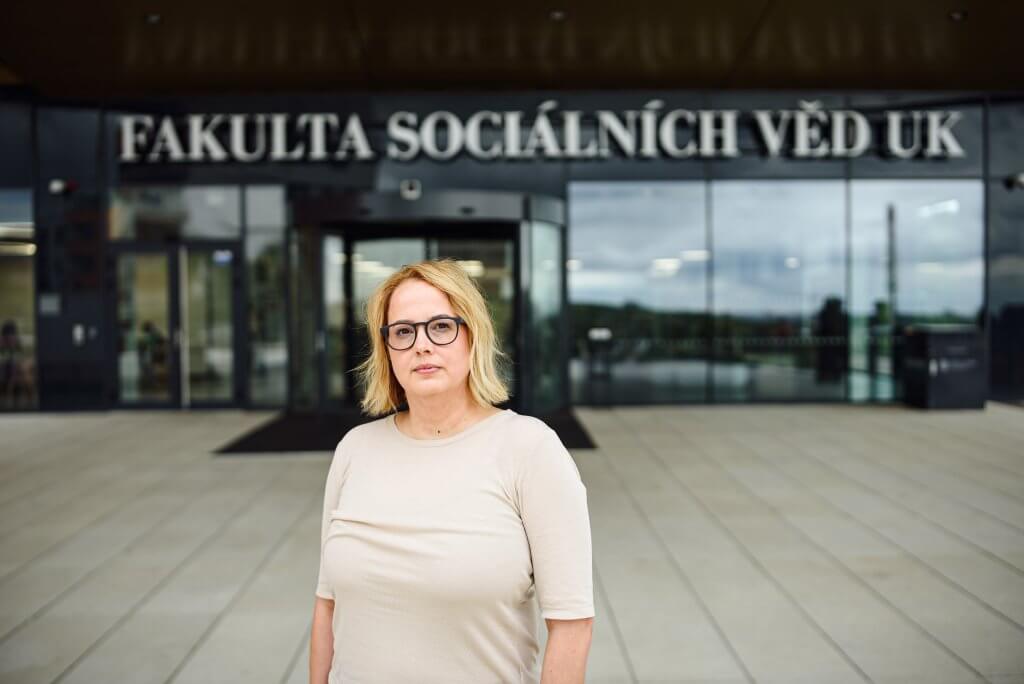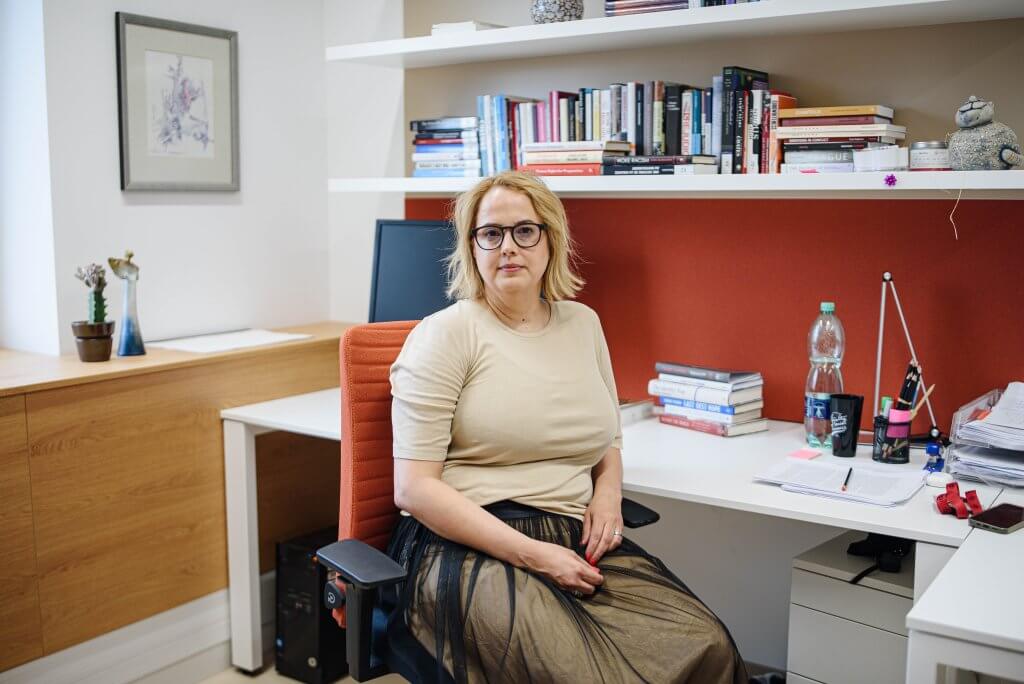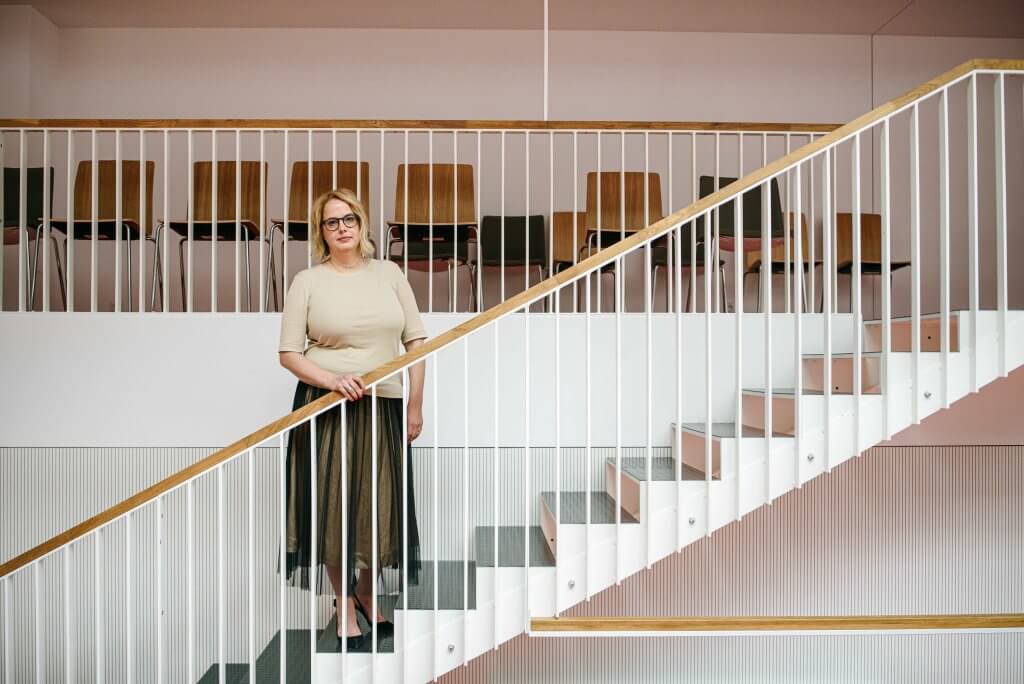“Really good science is never local, I draw inspiration from abroad,” says the researcher from IPS, who connects political science and history

After completing her master’s degree, Hana Kubátová felt that she still did not know enough, so she decided to stay in the academic environment. Currently, she works as a researcher and teacher at the Institute of Political Studies, is finishing the book she has been working on for seven years, and is participating in a number of research projects. At the same time, the desire to always discover something new does not leave her even after years.
After graduating from the Bachelor cycle at FSV UK, Kubátová went to study at the Central European University in Budapest, where she graduated with a master’s degree in Nationalism Studies with a specialization in Jewish studies. “The Central European University stays really close to my heart – there I learned the importance of critical reading and discussion instead of memorization. It was there where I started attending lectures and seminars from other departments and fields,” explains Kubátová.
After finishing her master’s programme, she returned to Prague and applied for doctoral studies at FSV UK, which she spent mostly abroad. She spent several months in Slovakia, then in Germany, followed by a year in Israel and wrote her dissertation in the United States of America. In her research, she mainly focuses on the connection between history and political science. In the center of her attention are prejudices and relations between the majority and minority population. For a long time, she also dealt with anti-Semitism and the Holocaust, which she examined not only as a purely political but also a social event. During her academic career, she often moved and still moves between several disciplines – and she considers this to be the key to successful research.
“If I could, I would add other fields – for example, I am fascinated by the research of social psychologists who deal with what happens to perpetrators of violence, why we as a community and individuals feel like victims and how collective guilt affects how we perceive ourselves and the others,” describes Kubátová and adds that she is also interested in sociological or economic publications about human rights, inequality and identities. “Many people are dealing with similar questions, but we know so little about ourselves. I like the process of trying to understand why someone looks at a given topic from a different angle and what a particular disciplinary approach makes it possible to see and, conversely, what it overlooks,” she explains.

That’s also why she doesn’t like frequent pigeonholes and questions about whether she feels more like a political scientist or a historian. “It annoys me how often interdisciplinarity is talked about, but at the same time how much it has become a buzzword that means little or nothing. And yet the best books, in my opinion, are the ones that are uncomfortable, go against what we think, and provoke. And that, in my opinion, is only possible when a person steps out of what they know,” she points out. In her work, she also still draws on her foreign study experiences and emphasizes international cooperation. “It may sound like a cliché, but really good science is never local or national. Whenever I start a new project, I look forward to going out with it for a while – just to get new inspiration, come up with new things and come back with a better, deeper version,” she describes.
Satisfaction with foreign cooperation
She is currently a member of the research team of The Past is Present: The Use and Misuse of Traumatic Historical Events in Foreign Policy project, which runs from 2022 and is part of the Charles University Primus programme. The FSV UK research team, led by Irena Kalhousová, examines how trauma and traumatic past affect international relations. Together, they are working on an article in which they analyze parliamentary debates and examine how the normalization of the extreme right, a phenomenon already described in the literature, manifests itself in how political actors view the national past.
“It’s a very fascinating subject, which again allowed me to look at what I do from a different angle. I think this is exactly the type of project it should be – it brought together people from the United States, Israel, Great Britain, Germany and the Czech Republic to search for answers on how much history and its processing affects politics,” says Kubátová. “We read each other’s texts, we write together. Now, for example, specifically about whether social norms or social discourse are changing and how one or the other affects the way we look at neighboring and more distant countries. I am very happy with this project,” she adds.
Until the end of last year, she was also the main researcher of the project called The Center for the Transdisciplinary Research of Violence, Trauma and Justice (VITRI). In addition to FSV UK, several faculties of Charles University also participated in the project – Faculty of Law, Faculty of Mathematics and Physics, Faculty of Medicine in Plzeň and Faculty of Arts. Thanks to this, the center brought together political scientists, historians, social psychologists, psychiatrists and lawyers who dealt with various forms of (mainly collective) violence.

“In the project, we worked on our own topics, but we also tried to connect older and younger scientists through different disciplines and approaches. It was a beautiful time – even arguing about terms and concepts in the beginning – because there were people who were interested in learning. We had endless and sometimes heated discussions, not because we wanted to be right at all costs, but because we were looking for it together,” she describes.
Until the end of last year, she also worked as a responsible researcher for FSV UK in the project The Communication of Expertise as a Means of Strengthening Societal Resilience in the Postfactual Era (CURIE), which received grant support within the Éta programme of the Technology Agency of the Czech Republic (TA ČR). “I think that just as some projects arise from positive inspiration, others are the result of frustration – and CURIE was an example of the latter,” explains Kubátová. “I wrote the project with Ondřej Ditrych and Ondřej Císař during the first wave of the COVID-19 pandemic. We reacted to the government’s chaotic communication with society. At the same time, we were saddened by the fact that doctors – especially dentists – and generally people whose expertise was in a completely different field spoke about topics such as the effects of the pandemic on politics, trust in political decisions or relations between citizens,” she adds. The result of the project, among other things, was the new Najdiexperta.cz database, which is supposed to serve to strengthen the dialogue between the scientific community and journalists and improve the quality of public policies.
Getting excited about something again
In addition to working on projects, she also organized two international conferences last year in cooperation with other colleagues. On one hand, the annual conference of the European Consortium for Political Research (ECPR), which was attended by 2,400 researchers, PhD students and academics from almost fifty countries. And then the prestigious Lessons & Legacies conference, which was held for the first time in the Czech Republic and at which leading experts on the history of the Holocaust from around the world discussed the latest research on the persecution and genocide of Jews and Roma during the Second World War.

Together with this, she also wrote her third book entitled Christian Nationalism, Nation-Building, and the Making of the Holocaust in Slovakia, which will be published by Oxford University Press and in a Slovak translation by N publishing house at Denník N. Moreover, its Hebrew translation is also currently being negotiated.
“In the book, I focused on Christian nationalism and how it enabled or justified ethnic violence during the Second World War. I was particularly interested in how the ideology proclaimed from above, from the center, became a political practice even on the periphery. In other words, I examined the realities of wartime Slovakia, but also the broader question of how political ideologies travel – both in space and time,” explains Kubátová. “But it’s such a strange feeling. I had worked on the book for seven years. I think, seven is the number of fullness, but for me it’s quite an emotional time when I’m saying goodbye to a piece of myself and at the same time looking for myself again,” she adds.
She wants to stay in the academic environment because, as she says, some questions still keep her awake. Currently, she is already thinking about a new project, she participated in the summer methodological school of machine learning in the statistical program R, and she wants to fill her free time with reading, which she did not have so much time for while writing the book. “Now every month I order or borrow books that I heard about and didn’t have time for. I enjoy reinventing things. That’s the beauty of science – that it’s endless. I’m also very lucky to be surrounded by people who do great things and are kind and funny about it. I would like to learn more from them and at the same time get excited about something again,” she thinks. “I think that, paradoxically, what attracts me the most now is what I fear the most – that moment when a person finishes something, but does not yet know what he will do next. When one is worried about whether they will ever write something again, but at the same time they are very much looking forward to it,” concludes Kubátová.


